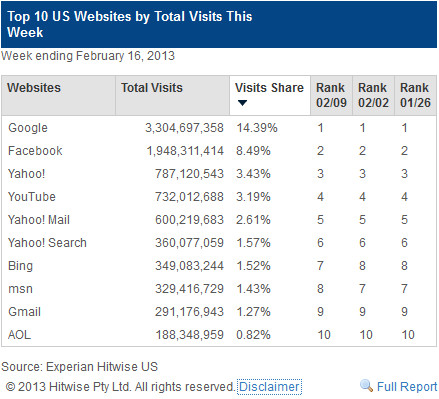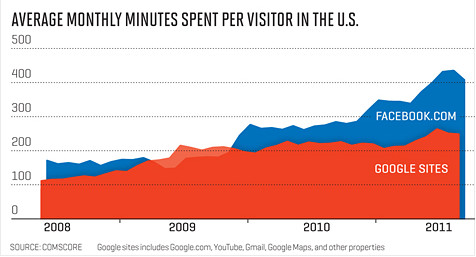In the past few weeks, I?ve been confronted multiple times by the question of whether social media is truly worthwhile for local businesses. The question comes from companies feeling the pinch of costs while also desiring to promote themselves adequately. The ROI may not be clear in many cases, so let?s examine it.
First of all, businesses have been propelled toward being involved in social media because marketers are attracted to any channels or arenas that large swaths of consumers gravitate to. As the usership of various social media services has grown, the rule-of-thumb is that their worth as a promotional vehicle has grown as well. Advertisers want eyeballs.
Where Are The Eyeballs?
According to Experian Hitwise, Google and Facebook are both the top websites in terms of number of visits:

And, according to comScore, users have been spending a lot more time in Facebook, too:

Does Social Media Have Value?
No one particularly questions the value of Google as a source for customer referrals to businesses; (although, some debate the ROI of PPC advertising for some companies/industries), however, almost everyone wants to be found in the organic search results to one degree or another. And, Facebook is clearly right up there in its volume of visitors.
Of course, just the fact that a service has a huge audience doesn?t automatically equate to worth in business promotions. For instance, a video game service isn?t going to be as worthwhile as a search engine where people are trying to research products and services, selecting the companies that provide them.
So, there?s a valid criticism that some social media services and the activities taking place on them will not lend themselves to some types of business promotions as readily as for others.
What Are The Gripes?
Most of the conversations I?ve had with those questioning the value for small businesses center on criticisms around a few common gripes:
- No sales. They don?t see direct sales arising from social media activities. Most people are not using Facebook or Twitter to find products or services, so there?s no purchase intent involved.
- No traffic. Their analytics are not showing much direct referral traffic from social media services.
- Work invested in social media is like ?sharecropping.? You can put all that time and effort into some services, and the content is ?owned? by them, and the value can evaporate at the whim of the social media companies. For instance, quite a number of companies developed large audiences on Facebook only to recently have those audiences ?held hostage? when Facebook last year began demanding advertising payments in return for exposing new status updates to followers of business pages.
Are The Gripes Valid?
From my perspective, these criticisms are sometimes skewed and are not showing a complete picture.
First, the ?sharecropping? metaphor seems like a straw man argument to me. Quite a lot of promotion work is ephemeral in nature, providing benefit for only a limited period of time. Just because it could evaporate tomorrow doesn?t negate its worth today. For that matter, you could build your shop in a particularly popular neighborhood only to have highways change and traffic directed away from your district. Point is, there are risks involved with business and promotion channels, but we don?t close down and go home because of it.
It is valid to consider that your business might not see sales and website traffic directly from your activities on social platforms. Although, this is by no means a foregone conclusion. I had a client in an esoteric service industry just a few weeks ago who thanked me profusely for recommending Twitter to him, because he immediately gained a new customer who found him due to his Tweeting activities.
While my client?s target demographic is well within that of Twitter users (he caters to technologists), all sorts of businesses can gain clients from their social network promotions to some degree, if they know what they?re doing. Merely spewing self-referencing mentions or a barrage of ads is probably going to result in irritation for the social audiences and frustration for the business owner who sees no ROI arising from the effort.
Those complaining of lack of sales and site traffic might not be doing effective social promotion work to begin with. As Derek Edmond points out in his article on How B2B Marketers Can Develop A Better Social Media Plan,?it can take a while for a company to learn how to use a social channel properly and to promote through it ? over 50% require from seven months to four years to ?get it?!
So, if you?ve experimented around with a social platform for only a few months and throw in the towel, it?s possible you haven?t given yourself a chance to master the medium.
Indirect Benefits Of Social Media
But, even if a particular social platform doesn?t lend itself to your business through sending traffic or sales prospects, there may be substantial indirect benefits that should be taken into account. Here are the main ones:
Search Engine Optimization (SEO)
Social media activities provide signals that can help sites rank better. Google and Bing have both acknowledged that they?re now using social activity signals in the mix. While we don?t know the exact methods they use, it doesn?t stop us from integrating social media work in order to extract ranking value.
With 200+ ranking signals in an algorithm, it?s difficult to isolate the influence of any one factor, but I?ve seen enough anecdotal evidence to believe good social media development over time does, indeed, provide some ranking benefit. Particularly if your competitors are not doing it.
There are only a handful of ?prominence? signals that we?re certain of ? external links, citations, business listing interactions (clicks on maps, driving directions, clicks to website), frequency and volume of user ratings and reviews, and ? social media interactions. Do you think you can afford to throw away one of those?
Proactive Online Reputation Management (ORM)
Being involved with a few of the more popular social media services provides a level of insulation from attacks on your reputation. The profiles of social media sites and status updates or other activities on them can rank in Google search results, making it harder for any negative webpages to appear when your name is Googled.
Without enough content ranking on your name, any dissatisfied customer, competitor, disgruntled former employee, or random crazy can say something bad about you, and it could appear prominently in search results. So, social media work carries a benefit that?s similar to insurance ? if you get hit by a false claim or exaggerated criticism, your bottom line could take a substantial blow.
Availability
It?s possible that making your business available through some of the higher ranking social media platforms could be a sign of your relative stature. Not that it?s a status symbol, so much as a subtle signal to consumers that your business is important enough to merit having a presence in places where they ?live? online.
Facebook?s rollout of Graph Search for instance, could push users into searching for businesses more. (If you?ve opted into Graph Search, try searching for ?restaurants my friends like.? This sort of search capability is ultra-strong for many types of business where endorsements from a consumer?s social circle can heavily influence decisions!)
Being available for this type of search is likely to become more important over time, and signaling that people can communicate with you through the platforms they?re comfortable with is likely beneficial as well.
Social Media Can Be Worthwhile
So, while it?s true that many businesses may not see as direct of a return on social media development work, there are a number of significant indirect benefits that make it worthwhile. This does not mean that a company needs to be involved with every large and small social media platform, and it doesn?t mean that large quantities of time must be spent on social media activities.
Different businesses are going to be more or less relevant to audiences at particular social networks. But, assess the bigger ones carefully: Facebook, Twitter, Instagram, Pinterest, YouTube, Google+, Tumblr and LinkedIn.
In terms of the amount of time spent, there?s usually some amount of time savings if you?re engaging with multiple social platforms, if you?re using good management tools to do it, and if you understand how to go about it.
Just because you may not see direct or immediate benefits fresh out-of-the-box when you begin using social media does not mean that you are not getting some benefit. Over time, the slow accrual of SEO benefit alone may make it a necessity for you, while proactive reputation management and consumer engagement may also be compelling reasons to be present and active.
Opinions expressed in the article are those of the guest author and not necessarily Search Engine Land.
Related Topics: Local Search
Source: http://searchengineland.com/is-social-media-worthwhile-for-local-businesses-149092
kevin love think like a man world peace world peace lakers colorectal cancer metta kashi
No comments:
Post a Comment
Note: Only a member of this blog may post a comment.